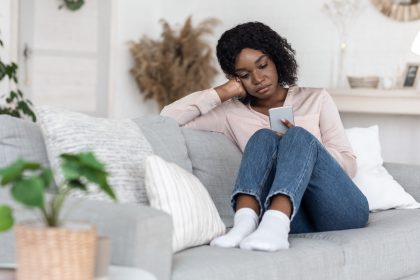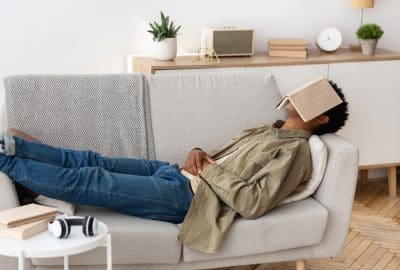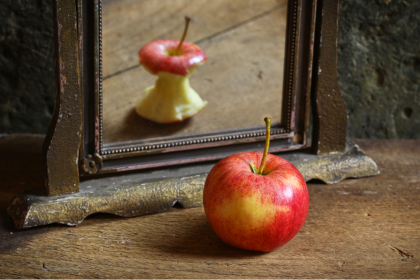
With recent reports of Kanye West’s and Kid Cudi’s mental conditions trending in the media, depression is finally becoming a topic that is being addressed in the black community. One individual who is acknowledging and addressing the stigmas related to mental illness and depression is actor and former NFL player Jay Barnett. Barnett has been working diligently to inspire young men and women to be the best they can be by sharing his testimony and struggles with depression, as well as implementing programs such as TheMEproject, “a five-week self-development course for middle school boys transitioning into Men of Excellence.”
Rolling out had the opportunity to speak with Barnett regarding depression, particularly in the Black community.
What caused your depression?
I think for me it was the lack of having a male figure in my life, especially the time I lost my father through a divorce at the age of 13. I think those are very pivotal years for any boy or any male, especially in the Black community. More than 50 percent of kids are growing up in single-parent homes, so for me, it was just not having his presence, not having his guidance, not having this reassurance of being a boy and having someone to help me navigate through the adolescent years. Depression fell upon me, because [I] didn’t have anything to really live for in regard to having a male figure or having a role model or blueprint to follow. Depression is built on the premise of anger and resentment, and that’s really where it begins for a lot of African American boys.
What are some of the triggers for depression in the Black community?
I think for us [it’s] anger, lack of resources, and also a lack of exposure. It’s perspective or perception. A lot of times when kids are going to school and they’re seeing kids who maybe have a two-parent home or maybe kids who have a little more than they do, it can really make kids angry because they begin to question why [their] family doesn’t have this or why [they] don’t have a dad. A lot of it comes from lack, whether it’s lack of education, a lack of resources, a lack of support, and I think, more importantly, it comes from a lack of love. We’re not really taught how to really love ourselves because many times, and it’s very, very sad, we are accompanied or we’re raised by parents that have not learned to love themselves. So a lot of times the parents are projecting their feelings, their insecurities and their own issues. It’s hard for a parent to give what they don’t have. This within itself creates a young male to have a very callous attitude or creates the young lady, that has a very promiscuous attitude or [has] promiscuous behavior because the root of it all is that we’re looking for acceptance and we’re looking for love. But depression sets in and its root cause is anger because we don’t have many of those things we desire.
How did you get through your depression and how would you recommend others who are experiencing depression to become the best person they can be?
What I had to realize was that the man who I had become had a lot to do with the man I didn’t see, which was my father, or the lack thereof, in my life. And then, when I began to step outside of myself and look at the decisions I had made and the decisions that I was making, I had to address a lot of the issue that I hid for so long: that I was mad at my father, I was mad at my parents for divorcing, I was angry at my situation as a whole, so I had to face it. I met a guy that encouraged me to get some professional help, especially after my football career had failed. Once I got into this guy’s office and he began to peel back the layers, I began to realize that the wall had nothing to do with my issues. I would encourage young males to not just so much seek out professional help, but when you are seeking professional help, seek people that you can develop a level of trust with, because, with men, we’re different from women. We won’t open up until we trust you. For men that are experiencing depression, I would encourage them to build a relationship before they become vulnerable, before they begin to open up. Seeking professional help can be very challenging because you don’t know what works, you don’t know what won’t work, but the first thing is acknowledging that you are in a state of depression, and it’s nothing wrong with that, but also accepting that you need help.
What can be done to eliminate the stigmas of mental illness in the Black community and how do we find the support we need?
I think it starts not only with a conversation, but it also starts with the support of a community. When you look at Kanye’s incident and you look at Kid Cudi’s incident, it’s almost like you have to have people in high places experience these lows for everyone else around them to see that “oh these people are not machines.” And I think we need to have not just celebrities, but people who have a large following, people who are very influential us[ing] their platforms to have these discussions. And we need more men to speak about it because, when a man becomes open and he shows his courageous attempts about an issue or a topic, it’s almost like everybody else drops their masks and says “Oh if he’s talking about it, then it’s OK.” We need more men to start speaking about these issues, more Black men [like] myself and other men who have had these experiences and lived through them. We need more people to know that they’re not in it by themselves and depression does not have a color, it’s not [about] what your social status is, or what your financial status is. Depression can hit anyone. And the thing for us as a Black community is that we have to stop waiting for other races and waiting on other people to take responsibility and accept the obligation to talk about things that are going on in our community, and open the door for [people such] as myself and others to have discussions. And I think when we begin to have those discussions, it allows everybody to be able to embrace it. And it’s going to start with men like Kid Cudi talking about it and really using that platform in a way to educate and empower.
Barnett has also published books for young girls and boys, titled Letters to a Young Queen and Hello King: Claim Your Throne. Both are available on Amazon, iTunes, Kindle and Nook.
















